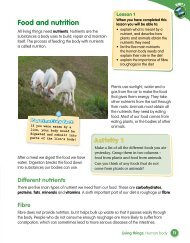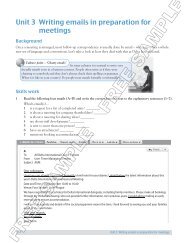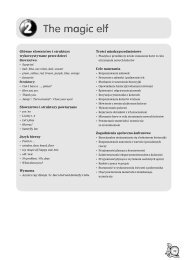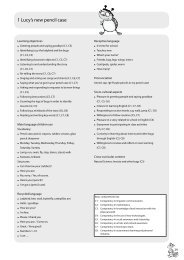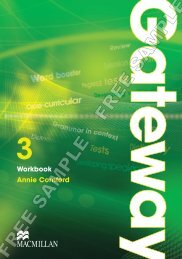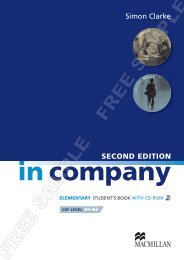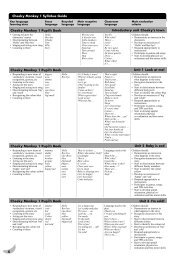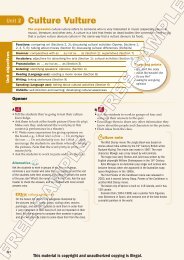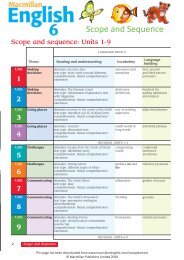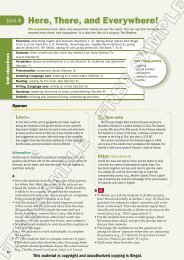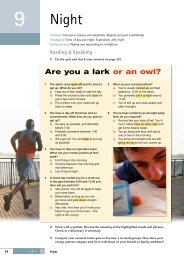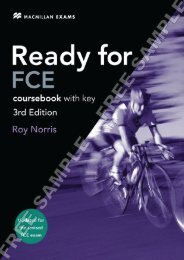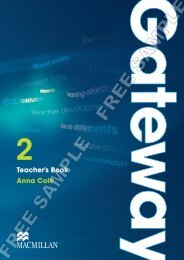1 - Macmillan
1 - Macmillan
1 - Macmillan
You also want an ePaper? Increase the reach of your titles
YUMPU automatically turns print PDFs into web optimized ePapers that Google loves.
1 Building a career<br />
1.1 About business The education business<br />
Discussion<br />
1 Decide which of these factors would be most important to you in choosing a business<br />
course. Order them from 1 = most important to 10 = least important.<br />
quality and reputation of faculty<br />
cost<br />
quality and experience of fellow students innovative curriculum<br />
help with finding top jobs<br />
sports and social facilities<br />
location<br />
earning potential<br />
alumni network<br />
accommodation service<br />
Predicting and reading<br />
2 Read the title of the article opposite. Which of these marketing techniques do you think<br />
are used<br />
telemarketing<br />
mail shots<br />
TV advertising<br />
travelling shows<br />
discounts for early booking free holidays<br />
weekends at Harvard<br />
sponsorship<br />
Search for the keywords<br />
”best business schools”.<br />
Choose the school you<br />
would most like to<br />
attend. Hold a class<br />
opinion poll to find the<br />
most popular choices.<br />
3 Read the article and check your predictions.<br />
Scan reading<br />
4 Find what these numbers from the article refer to.<br />
a 23,000 c 80% e 35 g 60,000<br />
b 9% d 10% f 43,700 h 8000<br />
Reading for detail<br />
5 Read the article again and complete the chart.<br />
Listening and discussion<br />
6 1:01 Listen to four students reacting to the<br />
article. Match each speaker 1–4 with the correct<br />
summary a–d.<br />
a Universities should be accessible to everyone.<br />
b Universities reinforce an unequal system.<br />
c Universities are right to be commercial.<br />
d Universities are right to be selective.<br />
7 Discuss your own reactions to the article and<br />
your opinions on elitism in education.<br />
The Harvard battle plan<br />
Phase 1<br />
1 Purchase from<br />
examination boards.<br />
2 Send to high school<br />
juniors.<br />
3 Visit and travel to other<br />
countries.<br />
4 Send out to identify<br />
possible candidates.<br />
Phase 2<br />
5 Sort applications and give a score<br />
from .<br />
6 Local discuss the case for<br />
and against each candidate.<br />
Phase 3<br />
7 lobby successful<br />
candidates by phone.<br />
8 Invite applicants to spend<br />
at Harvard in .<br />
6
1.1 About business<br />
How Harvard gets its<br />
best and brightest<br />
SURE, students work hard to get into this elite college.<br />
But so does the admissions committee, assures Dean Bill<br />
Fitzsimmons.<br />
In the US, few competitions are more cutthroat than<br />
the college admissions game. And every year it grows more<br />
intense as an ever-larger pool of high school seniors apply<br />
for one of the coveted spots at the nation’s top colleges.<br />
Meanwhile, the elite colleges have been stepping up their<br />
efforts to attract the best and brightest students – the<br />
prized pupils who will help increase the prestige of their<br />
campuses.<br />
You might assume that Harvard College – blessed with<br />
higher education’s greatest brand name and an endowment<br />
second to none – could afford to remain relatively aloof<br />
from this battle. But in reality, ‘There is no place that works<br />
harder than we do,’ says William R ‘Bill’ Fitzsimmons,<br />
Harvard’s veteran dean of admissions.<br />
For the new academic year, which will start in September,<br />
Harvard received a near-record 23,000 applications. Of<br />
these, it accepted a mere 2,100 – or just 9% – ranking it as<br />
the nation’s most selective college. Even more impressive,<br />
some 80% of the chosen ultimately decided to attend<br />
Harvard – a rate that is easily the highest among colleges<br />
and universities.<br />
The real surprise, however, is how hard Harvard works<br />
behind the scenes to achieve these amazing results. From<br />
his corner office in Byerly Hall, Fitzsimmons oversees<br />
a carefully considered three-part battle plan. The first<br />
phase begins in the spring, when Harvard mails letters to<br />
a staggering 70,000-or-so high school juniors – all with<br />
stellar test scores – suggesting they consider applying to<br />
America’s best-known college. Harvard buys their names<br />
from the examination boards which administer aptitude<br />
and college-admission tests.<br />
Each year, Harvard’s admissions team tours 140<br />
US cities, as well as hundreds of other places in Latin<br />
America, Europe, Africa and the Far East. This year, 10%<br />
of the admitted students came from abroad. In addition<br />
to his staff of 35, Fitzsimmons enlists Harvard’s coaches<br />
and professors to look for talent. The math department,<br />
for instance, starts to identify budding math geniuses by<br />
keeping a close eye on kids doing well in math contests.<br />
Harvard students also get into the act. Since 2003,<br />
Harvard has hired fifteen to twenty low-income students to<br />
call and email promising low-income high school students.<br />
Their job: to counter the ‘impression that Harvard is only<br />
for the rich and elite,’ says Fitzsimmons. In fact, under<br />
Harvard’s relatively new financial aid policies, parents<br />
who make less than $60,000 a year aren’t expected to<br />
pay anything toward the annual $43,700 fee for tuition,<br />
room and board. Fitzsimmons also sends an army of some<br />
8,000 alumni volunteers to tour the country to identify<br />
and recruit promising high school students by holding<br />
shows where they live. Later, they also interview nearly<br />
all applicants.<br />
By then, Fitzsimmons will be deep into the second<br />
phase of his battle plan: sifting through the thousands of<br />
applicants. Every application is rated on a scale of one<br />
(the best ever) to six (the worst ever). Then, in February,<br />
the applications are divided up geographically among<br />
twenty subcommittees. ‘We present the case for each<br />
applicant like a lawyer would,’ says Fitzsimmons. ‘This is<br />
the polar opposite of a computer process and because we<br />
have so many people involved, there are lots of checks and<br />
balances.’<br />
Once the final decisions have been made, Fitzsimmons<br />
and his team move to phase three: an all-out push to<br />
convince the chosen few to attend Harvard. Professors,<br />
alumni and students are all recruited to start calling the<br />
admitted. And in mid to late April over half of those<br />
who were accepted typically show up at Harvard for an<br />
elaborate weekend.<br />
The Harvard pitch is clearly effective. ‘What we aim to<br />
do is to get the very best faculty together with the very<br />
best students,’ Fitzsimmons says. ‘Our hope is that these<br />
synergies will develop the talents of these students to a<br />
much greater degree and that they will then give back<br />
a lot more to America and the world.’ That belief may<br />
sound corny, but it’s clearly helped drive Harvard to go to<br />
enormous lengths to find the best and brightest.<br />
7
1 Building a career<br />
1.2 Vocabulary Education and career<br />
Brainstorming<br />
1 Think of as many good reasons as possible for studying business.<br />
2 The letter below discusses reasons for attending business school. Choose one verb for<br />
each of 1–10 to complete the letter with the correct collocations.<br />
Dear Sonia,<br />
You asked my advice about going to business school. Well, don’t miss out on<br />
a wonderful opportunity to (1) gain/boost/make knowledge and to (2) make/<br />
acquire/do skills which will serve you for a lifetime. As well as (3) gaining/<br />
receiving/improving your employability and (4) having/boosting/making your<br />
future earnings, you’ll (5) get/have/obtain lots of fun (6) going to/doing/getting<br />
parties and (7) doing/making/learning friends. If you choose a good school you’ll<br />
(8) enhance/receive/learn tuition from experienced professors and (9) obtain/do/<br />
make practical experience that will really (10) enhance/obtain/gain your CV. In<br />
your shoes, I wouldn’t hesitate for one moment!<br />
3 Look again at the list you made in 1. Are any of the ideas in the letter to Sonia the same<br />
as yours Which phrases would you add to your list<br />
4 With a partner, decide which collocations in 2 relate to professional rather than personal<br />
experience. Use them to write sentences about yourselves that you could use in a job<br />
interview.<br />
Funding<br />
5 Read the extract below about how to pay for studies. Choose a verb from the box to<br />
complete each gap.<br />
obtain finance borrow support win subsidize arrange<br />
If you’re not lucky enough to be married to a millionaire or to have parents with very deep<br />
pockets, you may be wondering how to (1) the next step in your education. Customs<br />
vary from country to country; one of the most popular solutions is to (2) a student<br />
loan, sometimes interest-free or tax-deductible, that is only repayable when you are in full-time<br />
work. Many students who are unable to (3) money from friends or family prefer to<br />
(4) themselves by working part-time, and some are able to (5) grants from<br />
local government or to (6) scholarships from their universities. If you’re already in<br />
work, try persuading your employer to (7) your studies – in some countries companies<br />
are bound by law to contribute towards further education.<br />
Discussion<br />
6 What are the advantages and disadvantages of the methods of financing your education<br />
mentioned in the article Which ones would you use<br />
7 Work with a partner. You are going to read about a businesswoman named Jacky. Ask<br />
questions to exchange information and complete the description of her education. Student A<br />
should turn to page 110. Student B should turn to page 112.<br />
8 Talk about your education. Was it different from your parents’ education What sort of<br />
education would you like your own children to have<br />
8
Further interactive vocabulary practice on the DVD-ROM<br />
1.2 Vocabulary<br />
Action verbs<br />
9 Complete the CV with appropriate action verbs from the boxes. Then use them to write<br />
sentences for your own CV.<br />
contacted<br />
recruited<br />
exceeded<br />
met<br />
presented<br />
trained<br />
2002–2004 Sales manager, Way2Go Travel, UK<br />
1 corporate clients by phone and 2 incentive travel programmes to Boards of<br />
Directors<br />
3 and 4 new sales reps<br />
5 sales targets for every month and 6 annual objectives by twenty per cent<br />
chaired<br />
designed<br />
managed<br />
drew up<br />
motivated<br />
implemented<br />
2004–2007 Sales and marketing manager, Hondo Holidays, Texas<br />
7 sales materials and 8 innovative advertising campaigns<br />
9 and 10 a team of 40 telesales operators<br />
11 a working party and 12 proposals for a new e-commerce division<br />
Career stages<br />
10 Decide which verbs from the box can refer to people who …<br />
1 are currently enjoying having no work<br />
2 lost their jobs due to poor company performance<br />
3 are making positive career moves<br />
4 are leaving a job they were unhappy with<br />
5 are making a geographical change<br />
6 lost their job due to disciplinary problems<br />
to be laid off to quit to be on assignment to be promoted to be suspended<br />
to be resting to be made redundant to be transferred to take a sabbatical<br />
to give in your notice to be dismissed to join a company<br />
Listening for gist<br />
11 1:02 Listen to six speakers talking about career changes. Use expressions from 10 to<br />
describe each situation.<br />
Search for the keywords<br />
”action verbs for<br />
resumes cvs”. Update<br />
your CV using dynamic<br />
action verbs and<br />
phrases.<br />
12 Work with a partner. Discuss the situations below.<br />
What would you do if …<br />
1 you were promoted to a job you knew was too difficult for you<br />
2 you were made redundant after 25 years’ service<br />
3 you were unfairly dismissed for harassing an employee<br />
4 you gave in your notice the day before the firm announced a 33 per cent salary increase<br />
5 you were transferred to Alaska<br />
6 you were on sabbatical for a year<br />
Listening and discussion<br />
13 1:03–1:05 Listen to three people talking about career choices. Make notes on the problems<br />
they face. Discuss what you would do and why. Then compare your answers with page 110.<br />
1 2 3<br />
9
1 Building a career<br />
1.3 Grammar Tense review<br />
Past simple<br />
She worked in Paris last<br />
year<br />
Past continuous<br />
She was planning to<br />
resign at the time<br />
Past perfect<br />
She had already heard<br />
the news<br />
Present simple<br />
She works in London<br />
Present continuous<br />
She’s travelling in Asia<br />
Present perfect simple<br />
She has travelled ten<br />
thousand miles.<br />
Present perfect<br />
continuous<br />
She has been visiting<br />
suppliers.<br />
Zero conditional<br />
If she meets her targets,<br />
she gets a bonus.<br />
First conditional<br />
If she gets the job, she’ll<br />
move to Spain.<br />
Second conditional<br />
If she was/were<br />
President, everybody<br />
would resign.<br />
will<br />
Oil prices will continue<br />
to rise<br />
going to<br />
Some day I’m going to<br />
start my own business<br />
Present continuous for<br />
future<br />
I’m flying to New York<br />
tomorrow<br />
Grammar and practice<br />
pages 116–117<br />
Test yourself<br />
1 A businesswoman, Lindsey, is describing her career status, history and aspirations. In<br />
the first extract, identify and correct the six errors relating to verb tenses in her story.<br />
Change the verbs to the correct form of past simple, past continuous or past perfect.<br />
When I left school I wasn’t sure what to do next. I was applying for a place at<br />
university, but while I had revised for my exams I already decided that I didn’t feel<br />
ready for university. I had read a lot about East Africa, and one day when I watched<br />
a TV documentary about Ethiopia, I suddenly knew that that was where I was going.<br />
In fact it was while I had worked with an NGO in Ethiopia that I was becoming<br />
interested in business.<br />
2 In the next extract, Lindsey explains her current projects. Complete the extract with the<br />
correct forms of the verbs in brackets. Use present simple, present continuous, present<br />
perfect simple, or present perfect continuous.<br />
I (1) (just finish) my course at the Franklin School of Business and I (2)<br />
(currently work) at JPC again while I (3) (consider) various opportunities.<br />
As JPC’s Finance Director (4) (leave) the company unexpectedly, I (5)<br />
(agree) to manage the finance department until a new appointment is made. For<br />
example, for the last three weeks I (6) (design) a new audit procedure which I<br />
believe will significantly improve financial control. However, I (7) (look) for a<br />
position in East Africa for some time now, and this one (8) (seem) perfect for<br />
my profile.<br />
3 In a job interview, Lindsey gave the following answers. Each answer is a conditional<br />
sentence. Choose the correct form of the verb to complete each sentence.<br />
1 If I get/am getting/got the job, I am trying/will try/tried to make myself available<br />
as soon as possible, but I am not/will be/wouldn’t be able to start immediately<br />
unless JPC will agree/would agree/agreed to let me go.<br />
2 You see, if I make/will make/made a commitment, I am doing/do/did my best to<br />
respect it.<br />
3 If by any chance the job will be/would be/were based in Kenya, I am taking/would<br />
take/took it anyway, even though I’d prefer to use my Amharic.<br />
4 Lindsey is being asked about her objectives and mobility. Choose the correct future<br />
verb forms to complete the text: will, going to, or present continuous.<br />
In the short term, I hope (1) I’ll become / I’m becoming a department manager quite<br />
quickly. I’ve learnt a lot about management on the MBA, and (2) I’m going to put /<br />
I’m putting the theory into practice as soon as I can. On the personal front, (3) I’ll get<br />
/ I’m getting married next June; over the next couple of years my fiancé (4) will write<br />
/ is going to write TV and movie scripts, so (5) he is going to be / he is being totally<br />
mobile and happy to move as necessary.<br />
10
Further interactive grammar practice on the DVD-ROM<br />
1.3 Grammar<br />
Time markers<br />
5 Decide which time markers from the box are usually associated with the present simple and<br />
which are associated with the present continuous.<br />
usually currently always at present at the moment often<br />
6 Decide which time markers from the box are usually associated with the past simple and<br />
which are associated with the present perfect.<br />
ever in never ago already (not) yet when just since for last<br />
Search for the<br />
keywords ”how to<br />
write accomplishment<br />
statements”. Make<br />
a list of key points<br />
to remember when<br />
describing your<br />
accomplishments in a<br />
resume or interview.<br />
Listening<br />
7 1:06 Every ten years, the Franklin School of<br />
Business organizes a reunion party. Listen to a<br />
conversation between two of its graduates, Fraser and<br />
Jess and answer the questions.<br />
a What is Fraser doing at the moment<br />
b Where did Fraser work before<br />
c Why did Fraser leave that job<br />
d What has Fraser been doing recently<br />
e What did Jess do after leaving the business school<br />
f What is Jess doing at the moment<br />
g What is Jess doing soon<br />
h What does Fraser discover about Jess<br />
8 Write out your answers to 7 as complete sentences,<br />
taking care to use the right verb forms.<br />
Role-play<br />
9 With a partner, imagine you meet twenty years from now at a reunion party. Make polite<br />
conversation following the cues below.<br />
what … do<br />
how long … your most recent job<br />
what … at the moment<br />
what … recently<br />
what … after leaving college what … next<br />
‘We have a very low<br />
drop out rate.’<br />
Balloon debate<br />
10 Work in groups of three or four. You all work for the same private business school. Due to<br />
budget restrictions, there is not enough money to pay everybody’s salary, so one person must<br />
be made redundant. Choose one of the positions below, then each present details of your past<br />
accomplishments, current projects and future objectives: the group must then decide who has<br />
made a good case for continuing and who has to drop out.<br />
Marketing Manager<br />
Accomplishments: created positive image and brand<br />
name<br />
Projects: develop new markets and international<br />
contacts<br />
Objectives: become one of top ten schools in the world<br />
Personnel Manager<br />
Accomplishments: fi red boring professors, hired top<br />
consultants<br />
Projects: implement performance-related incentives<br />
Objectives: higher salaries and longer holidays for all<br />
staff<br />
Head of Administration<br />
Accomplishments: made school profi table after years<br />
of losses<br />
Projects: get corporate sponsorship and govt. funding<br />
Objectives: improve facilities and profi tability<br />
Director of Studies<br />
Accomplishments: replaced old books with multimedia<br />
programs<br />
Projects: develop revolutionary methods of learning<br />
Objectives: 100 per cent success in exams with only<br />
50 per cent study time<br />
11
1 Building a career<br />
1.4 Speaking Giving reasons in interviews<br />
Listening and discussion<br />
1 1:07 Listen to eight interview questions. Which of these questions about personal<br />
choices are reasonable interview questions Give reasons.<br />
Listening<br />
2 1:08–1:09 Ruth and Anaïs applied for the same job with Banco Agricolo. Listen to two<br />
extracts from their interviews and complete these statements with Ruth or Anaïs.<br />
1 chose to study business because it pays more than languages.<br />
2 chose to study business to prepare for a career as an international manager.<br />
3 chose the Franklin School of Business mainly for the quality of its programmes.<br />
4 chose the Franklin School of Business mainly to be with her boyfriend.<br />
5 has not prepared or organized her ideas.<br />
6 presents well-prepared and well-organized ideas.<br />
7 gives vague and sometimes irrelevant reasons.<br />
8 gives appropriate, precise and well-structured reasons.<br />
3 Put the expressions you have just heard in the appropriate group, as in the examples:<br />
Introducing a point: 1, …<br />
Seeing both sides: 3, …<br />
Combining reasons: …<br />
Adding ideas: 2, …<br />
1 Firstly ...<br />
2 Besides,<br />
3 On the whole ..., however ...<br />
4 As regards choosing business ...<br />
5 It not only prepared me to work ..., but it also means that ...<br />
6 In addition, a business degree always gets attention ...<br />
7 As far as my choice of business school is concerned,<br />
8 It’s true that the big names ..., but on the other hand, newer schools like Franklin ...<br />
9 For one thing, they have better facilities, and for another, they’re less expensive.<br />
10 What’s more, their curricula are ...<br />
4 With a partner, use expressions for combining reasons and adding ideas to complete these<br />
answers to interview questions. What were the questions<br />
1 Mainly for the variety. I get out of the office a lot, I meet a lot of different<br />
people. the salary was much better than anything else I was offered!<br />
2 Well, it’s very close to what’s known as the ‘Plastics Valley’. to lots of jobs, there are<br />
very good communications. , it’s one of the most beautiful areas in the country.<br />
3 Several reasons really. , it really relaxes me after a hard week, and , it keeps<br />
me fit. You can’t beat badminton for a good workout; and , it’s a great way to meet<br />
people.<br />
12
Interactive pronunciation practice on the DVD-ROM<br />
1.4 Speaking<br />
5 With a partner, use expressions for introducing a point and seeing both sides to explain the<br />
advantages and disadvantages of the following:<br />
1 Living in your parents’ home or moving away and sharing a flat with friends.<br />
Example<br />
Firstly, living with your parents is not always easy. On the whole it’s cheaper to stay at<br />
home, but the experience of living away from home is richer. As regards sharing with<br />
friends, it’s true that sometimes there will be personality clashes, but, on the other hand, it’s<br />
good to know that there’s always a friend around when you need help.<br />
2 Studying something you dislike but are good at, and which pays well, or something you love<br />
doing, are perhaps not so good at, and which is badly paid.<br />
3 Having a part-time job or borrowing money from the bank to pay for your studies, or working<br />
for two or three years before going to university.<br />
4 Taking an interesting but badly-paid job in a small company in order to get more responsibility,<br />
or a boring but well-paid job in a large company with few career prospects.<br />
5 Changing companies, cities and countries regularly to increase your experience and salary, or<br />
working all your life in the same town for the same company.<br />
Role-play<br />
6 Role-play the following job interviews. Student A should interview Student B for a job as<br />
manager of the world’s biggest night-club in Ibiza, then Student B should interview Student A for<br />
a job as manager of the world’s most famous circus. Follow instructions 1–4.<br />
Search for the keywords<br />
”illegal interview<br />
questions”. Make a<br />
list of questions you<br />
don’t have to answer<br />
in an interview, and<br />
the best way to react<br />
if an interviewer does<br />
ask them. Are there<br />
‘illegal’ questions which<br />
you find perfectly<br />
acceptable<br />
1 Meet in separate groups of As or Bs to decide what qualities, skills and experience you will be<br />
looking for in the ideal candidate. Prepare questions to test the candidate in each area.<br />
2 Agree on a time limit, and meet a partner to hold the interviews. Each candidate should give<br />
reasons why they are the best person for the job.<br />
3 After the interviews, meet again in your groups of As or Bs to decide which candidate will get<br />
the job.<br />
4 Meet in your pairs of A and B to announce the result and give your partner reasons why they<br />
did or didn’t get the job.<br />
13
1 Building a career<br />
1.5 Writing Cover letters<br />
Brainstorming<br />
1 When applying for a job or a placement, you should always send a cover letter with your<br />
CV or resume. In small groups, divide the list below into Dos and Don’ts for writing dynamic<br />
cover letters. When you have finished, compare your ideas with the list on page 110.<br />
Start your letter ‘Dear Sir or Madam’<br />
Write a formal introduction in the first paragraph.<br />
Ask directly for an interview.<br />
Write at least 400 words – the more information you give, the better.<br />
Use sophisticated language to make a good impression.<br />
Follow the AIDA model used in advertising – attention, interest, desire, action.<br />
2 Use the action verbs from the box to complete this email cover letter.<br />
broken capture developed doubled exceeded modernized<br />
obtained optimize present trained<br />
Dear Mr Crouch<br />
Having (1) objectives and (2) sales records in all my previous<br />
positions, and recently (3) my MBA in marketing at Warwick University,<br />
I feel I am an ideal candidate for the position of European Sales Manager at<br />
Starfi eld Nightclubs.<br />
In my last job as senior sales representative for Roxy Entertainment Ltd., I<br />
(4) new products for teenage customers, (5) sales staff, and<br />
(6) the membership management system. Over a two-year period, I<br />
more than (7) average revenues per venue.<br />
Nightclubs are a highly competitive sector of the entertainment industry,<br />
and I am certain I have the skills to (8) market share and (9)<br />
Starfi eld’s profi tability.<br />
I would be happy to (10) my ideas in more detail at interview, and I<br />
will call you early next week to arrange a meeting. If you have any questions,<br />
please feel free to contact me before then. Thank you for your time and<br />
consideration.<br />
Yours sincerely,<br />
Kiara Pointer<br />
3 Decide the purpose of each paragraph in 2. Which paragaph is intended to<br />
• request action<br />
• give details of the applicant’s accomplishments<br />
• get the reader’s attention<br />
• relate the applicant to the company, showing why the company should hire her<br />
14
Further interactive writing practice and model business documents on the DVD-ROM<br />
1.5 Writing<br />
4 Match sentence beginnings 1–10 with endings a–j to make typical dynamic sentences for<br />
cover letters.<br />
1 My outgoing personality makes me a my formal education.<br />
2 I recently graduated b to meet with you.<br />
3 I served as c a phone call.<br />
4 I attended school d a strong candidate.<br />
5 I supported myself e a career in insurance brokering.<br />
6 Jobs such as bartending enhanced f talk with you.<br />
7 I have the skills to embark on g by working in radio advertising sales.<br />
8 I would like very much to h from the University of Oregon.<br />
9 I will follow up this letter with i in Michigan, Arizona and Oregon.<br />
10 I can arrange a time j president of the debating society.<br />
Brainstorming<br />
5 In small groups, read the two job ads. For each position, list at least two qualities and two<br />
skills that the ideal candidate should have.<br />
Development Officer for Executive Education<br />
Based in Paris, you will promote the specialist<br />
training services of a top international business<br />
school to companies throughout Europe. You<br />
will generate and follow up leads, handle client<br />
appointments and presentations, prepare tenders<br />
and secure client commitment before handover<br />
to account managers.<br />
Brand Manager EMEA<br />
Based in London, but with extensive travel, you will be<br />
responsible for maintaining and developing a household<br />
name in video games. Liaising with head offi ce in Japan,<br />
you will design and implement marketing campaigns for<br />
the Europe, Middle East and Africa region, and ensure<br />
that cost and profi t objectives are met.<br />
Search for the keywords<br />
”what not to put on<br />
your resume”. Compile<br />
a class list of the top ten<br />
errors.<br />
Writing<br />
6 Divide into two teams, As and Bs. The As will apply for the position as Development Officer<br />
for Executive Education, and the Bs for the position as Brand Manager, EMEA. Follow the<br />
instructions below to write your letter.<br />
1 With a partner from the same team, list real or imaginary examples of your experience, skills<br />
and accomplishments which you want to mention in your cover letter.<br />
2 Plan the four paragraphs of your letter, using the examples you have listed.<br />
3 Write a cover letter, remembering to use action verbs whenever possible.<br />
7 In teams, A and B, exchange your cover letters. Read the other team’s letters, and decide<br />
which candidates deserve to be short-listed for an interview. Announce your decision to the other<br />
group.<br />
15
1 Building a career<br />
1.6 Case study Mangalia Business School<br />
Discussion<br />
1 Decide which of the following features are more advantageous for an international<br />
business school.<br />
history: more than 100 years old or modern new school<br />
funding: public or private<br />
students: 80% local and 20% foreign or 20% local and 80% foreign<br />
faculty: business leaders or researchers<br />
location: international metropolis or small seaside town<br />
site: campus or city centre<br />
Reading<br />
2 Read the information about Mangalia Business School and list its strengths and<br />
weaknesses in terms of its ability to compete on a global market.<br />
Mangalia Business School (MBS)<br />
Founded in 1992, MBS is a private business school in southeast Romania with an excellent reputation<br />
for quality in Central and Eastern Europe. Situated on the Black Sea coast, close to the Romanian<br />
Business Centre, which hosts international conferences and seminars, Mangalia’s climate and<br />
cultural heritage make it the ideal location for both summer schools and all-year study on a wellequipped<br />
seaside campus with comfortable accommodation for 300 students. The School offers<br />
internationally recognized undergraduate and masters degrees, as well as executive education<br />
tailored to the needs of individual companies. Faculty are recruited from Central Europe’s most<br />
successful companies. Work placements are organized in Romania, Bulgaria, Hungary and Ukraine,<br />
providing invaluable experience of international business.<br />
Courses<br />
15% summer<br />
schools<br />
20% MBA<br />
5% executive<br />
education<br />
60% undergraduate<br />
16
Further interactive problem-solving on the DVD-ROM<br />
1.6 Case study<br />
Search for the keywords<br />
”how much is an MBA”<br />
to find out how much<br />
it would cost you to<br />
get an MBA. Draw up a<br />
budget including tuition<br />
fees, living expenses,<br />
travel, etc.<br />
Listening<br />
3 1:10 Listen to an extract from a presentation given by Radu Ionescu, the Dean of MBS,<br />
and answer the questions.<br />
1 What alternatives is MBS facing due to globalization<br />
2 What does Radu Ionescu expect from his guests<br />
3 What has Ion Bumbescu offered, and what are his conditions<br />
Discussion<br />
4 In small groups, hold a meeting to discuss the brief below and draw up proposals for MBS’s<br />
five-year plan.<br />
Mangalia Business School<br />
Brief for international consultants<br />
Students<br />
12%<br />
Bulgarian<br />
11% other<br />
European<br />
2% non<br />
European<br />
1 Sponsorship<br />
Should MBS accept Bumbescu’s offer to sponsor the school (see point 3)<br />
19% Hungarian<br />
56% Romanian<br />
2 Tuition fees<br />
Until now fees have been average for business schools of this type. Should MBS<br />
maintain this policy, raise fees to a higher than average level, or reduce them to a<br />
lower than average level (see point 3)<br />
3 Development projects<br />
MBS can afford to invest in the development projects below as follows:<br />
At current (average) fee levels, one project only.<br />
If Bumbescu’s sponsorship is accepted, two projects.<br />
If fees are increased, one additional project.<br />
If fees are reduced, one project less.<br />
The possible projects are as follows:<br />
• strengthen faculty and increase research funding<br />
• improve and extend facilities<br />
• improve placement and career services<br />
• develop international recruitment and exchange programmes<br />
• your ideas ...<br />
4 Promotion<br />
Please consider the following, as well as your own ideas:<br />
Who should MBS target: undergraduates, future MBAs, corporate clients<br />
Where should MBS look for its future clients: Romania, Central Europe, Western<br />
Europe, the US, the Far East, worldwide<br />
How should MBS promote itself: materials, media, events, incentives<br />
Listening<br />
5 1:11 Listen to a radio news report. How does this news affect your proposals<br />
Presentation<br />
6 Present your proposals. The class should vote for the best presentation.<br />
17



